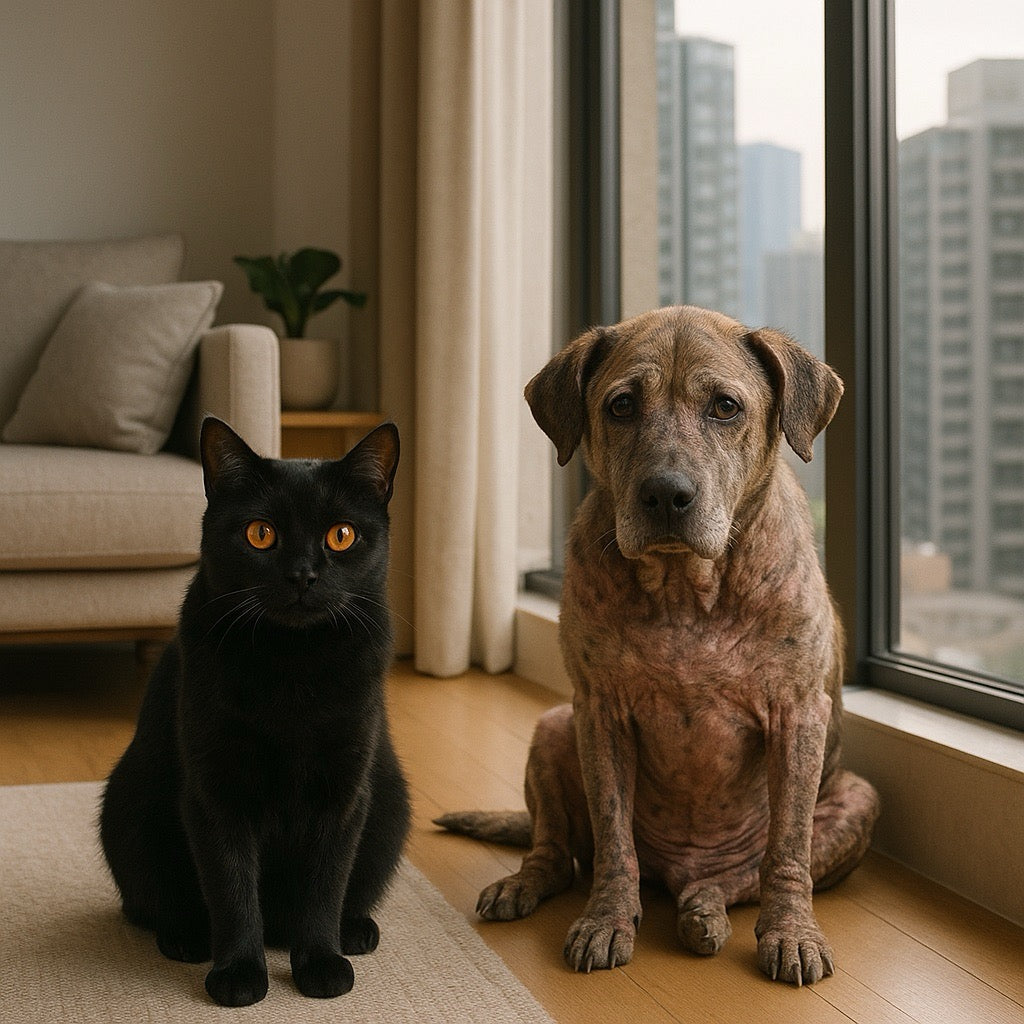
Why "Less Adoptable" Pets Make the Best Companions
Share
Why "Less Adoptable" Pets Make the Best Companions
You walk into a shelter expecting to find the perfect puppy, but your heart stops at an older dog sitting quietly in the corner. His graying muzzle and gentle eyes tell a story of patience -- he's been waiting six months for someone to see past his age. This is exactly what Adopt-a-Less-Adoptable-Pet Week is about: celebrating the overlooked animals who often make the most grateful, loving companions.
Understanding the "Less Adoptable" Label
Every September, the third week spotlights pets that statistics show struggle to find homes. According to Petfinder, these animals spend four times longer in shelters than their younger, healthier counterparts. Yet the label "less adoptable" often has nothing to do with their capacity for love or companionship.

Who Gets Overlooked?
- Senior pets top the list, despite offering unique advantages for urban lifestyles. A 10-year-old Labrador has already mastered house training and basic commands—perfect for busy professionals who want companionship without puppy chaos.
- Black dogs and cats face "Black Dog Syndrome," where dark-colored animals are adopted less frequently due to superstition and poor photo visibility in dimly lit shelters.
- Special needs animals include those requiring medication or having mobility challenges. Many conditions sound scarier than they actually are—diabetic cats simply need twice-daily insulin shots, while deaf dogs learn hand signals as easily as others learn verbal commands.
- Certain breeds face housing restrictions and misconceptions. Pit bull-type dogs often wait months longer despite having individual personalities unrelated to breed stereotypes.
The Hidden Benefits of Imperfect Pets
Skip the Puppy Problems
Adult shelter pets often arrive house-trained and socialized. No midnight accidents, chewed furniture, or months of basic training. A rescued senior dog often settles into routines immediately, making them ideal for apartment living.
Predictable Personalities
Unlike puppies whose adult temperaments remain unknown, older animals display their full character from day one. Shelter staff can tell you whether a dog loves fetch, prefers quiet evenings, or enjoys meeting children—crucial information for successful matches.
Grateful Hearts
Animals who've experienced uncertainty often form incredibly strong bonds with adoptive families. Beth Stern of North Shore Animal League America describes her blind rescue cat Bella as her "favorite"—the most affectionate and connected pet she's ever had.

Making the Right Match
Assess Your Lifestyle Honestly
Senior pets suit busy professionals who want companionship without intensive exercise demands. Special needs animals work well for experienced pet owners with time for medication routines. Large breed dogs might be perfect for families despite their "less adoptable" size label.
Understanding Care Requirements
Many conditions require minimal intervention. Arthritic dogs benefit from joint supplements and comfortable bedding. Diabetic cats need twice-daily insulin—a routine that becomes second nature within weeks. Local veterinary clinics provide excellent support for managing these conditions long-term.
The Bigger Impact
Every adoption of a long-waiting pet creates shelter space for another animal in need. Regional shelters operate at capacity, and choosing overlooked animals helps the entire shelter population. Additionally, adoption fees for senior or special needs pets are often reduced, making pet ownership more accessible while supporting a worthy cause.
Taking Action This Week
Visit local shelters during Adopt-a-Less-Adoptable-Pet Week. Ask about animals who've waited longest for homes. Spend time with senior pets, animals with minor medical conditions, or those whose appearance has worked against them. You might discover that the "imperfect" pet is actually perfect for your life.
These animals haven't been chosen yet not because they're inadequate, but because they're waiting for someone special enough to recognize their worth. Sometimes the pets who've waited longest have the most gratitude to give—and the most love to share with families willing to see beyond surface-level perfection.
Frequently Asked Questions
1. Aren't senior pets difficult and expensive to care for?
This is a common misconception! In reality, senior pets are often easier. Most are already house-trained and have outgrown destructive puppy behaviors. While they may have age-related conditions, many are easily managed with routine vet care and affordable medication. Plus, their adoption fees are often lower. You get a calm, loving companion who settles in quickly. For more details, see our sections on the Hidden Benefits and Making the Right Match.
2. What does "special needs" actually mean, and will it be too much for me to handle?
"Special needs" covers a wide range of manageable situations. It could mean a cat with diabetes requiring twice-daily insulin shots (a quick and easy routine), a deaf dog who learns hand signals, or an animal with arthritis needing daily joint supplements. The key is an honest assessment of your lifestyle. Shelters provide full transparency about care requirements, and you'll find that the deep, grateful bond you form with these resilient animals is more than worth the effort. Learn more about Understanding Care Requirements.
3. What are the real advantages of adopting an older pet instead of a puppy?
The biggest advantage is predictability! With an adult pet, what you see is what you get. Their personality, size, and energy level are already fully developed, making it much easier to find a perfect match for your lifestyle. You get to skip the most challenging parts of pet ownership—like house-training, teething, and constant supervision—and jump straight to the rewarding companionship. Adopting an adult pet means you're saving an animal that is often overlooked and deeply grateful for a second chance. Revisit the Hidden Benefits of Imperfect Pets to learn more.
